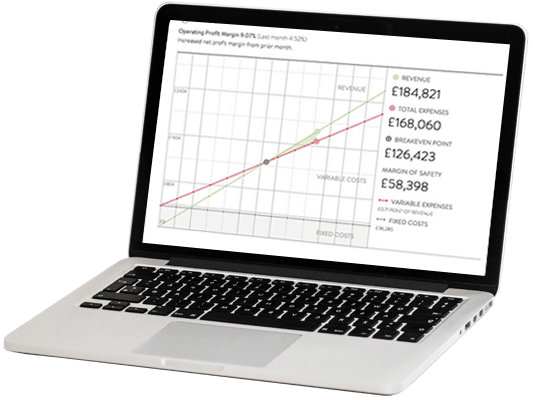Management Accounts
It’s hard to predict the future in business, but our management accounting service goes a long way towards helping. Take the first step to controlling your finances.

Business owners often see management accounts as confirmation of what they already know about their business. We, as an accounting firm, work closely with business owners, meticulously planning and forecasting their results. However, it is still difficult to predict what will happen to a business in the future, meaning the need for accurate management information is integral.
Business owners often assume that because cash has remained the same over the year, that profitability naturally follows in accordance. However, assuming the financial position of your business is dangerous because there’s no proof to back your assumptions. Partnering with a reliable accounting firm can provide the necessary expertise and analytical tools to ensure that your financial assumptions are accurate and your business is on solid footing.
Management accounts are the first step to truly controlling your finances and a vital tool for removing risk and safeguarding the interests of your business and its stakeholders.
Why is this? Without accurate, good data, it’s impossible to produce management accounts. Requiring management accounting keeps everyone within the finance team in check—it keeps the credit controller chasing debts, ensures the purchase ledger clerk continues to manage supplier accounts, and so on. By simply having detailed and accurate management accounts, you’ll be able to spot areas where there is room for improvement, not just within your business but also in your finance department.
Management accounts for complete financial insight for your business
We don’t create management accounts just for you to see a profit and loss statement every month. We give important consideration to various factors which can dramatically transform the fortunes of any business including:
- Year on year movement to each month
- Total sales and how they’re increasing or decreasing
- The change in wages and how they’re increasing
- Changes to gross profit
- Services that generate income and its profitability
- The cost of fee earners against their sales
- Client visits within a year
- The number of client visits per fee earner
- Scenario analysis
- Putting figures into context

What are management accounts?
Management accounts are a tool that business owners and managers use to keep track of how their business is doing on a regular basis. They report back on the basics such as sales figures and profitability and also more advanced areas like ratios and trends.
Management accounts are the “corrected” version of what already exists in an accounting system anyway. So the basic figures will be available for reporting already – the preparation of monthly management accounts is the process that finesses those raw figures and makes provisions and adjustments to reflect an accurate trading period, such as a month or a quarter.
It’s easy for a business owner to think, “I know what my sales are, and my bank account’s higher than what it was”, in an effort to avoid preparing monthly management accounts. However, preparing management accounts is the only real way of confirming that the bank account is higher because of good results, not just by coincidence. It also allows leaders to show results in context, so relative to another season or a past period. Doing “well” is good – but did the business do well compared to the same period last year? This is where management accounts show their value.
What are the benefits of keeping management accounts?
Management accounts allow what’s known as an operational plan (the nuts and bolts) to become a strategic one (stepping back a little). Without management accounts, a forecast has little benefit as it’s just a guess that’s never tested.
A common flaw in leaders’ treatment of their results is to dismiss a poor set of results. “We knew it’d be a slow month” or “We had a worker short for three weeks”. Explaining a variance is important to provide context – but if management accounts and the process that surrounds them aren’t respected, it becomes a habit for leaders to allow bad news. With this in mind, a proper management accounting process in place means that future periods can be asked to carry the failings of the past by rolling up variances. It also means that if there’s a bumper month, this can be used to relieve future, less productive ones.
Apart from just knowing how profitable a business is, it’s important to understand why it’s profitable. A business might sell three products and make a profit of £10k per month. Is that good? Well – looking at the product-by-product performance might show that there’s one product that’s actually costing the business money – and it might show that there’s a star product that’s not being exploited in the way it perhaps should.
There might be five pubs in a pub group and two of the pubs are making losses. But only properly prepared management accounts will show whether those losses are accurate – or perhaps their losses are due to the flash fleet of cars the boss is driving being poorly allocated across the pubs. Before the cars, maybe all the pubs are profitable – so it’d be a shame to close two down as someone has to pay for those cars!
Difference between management accounts and statutory accounts?
Preparing statutory accounts make up the lion’s share of many accountants’ income. They’re the figures that HMRC (and Companies House too, sometimes) want to see and they have to be prepared to particular standards and submitted in a strictly defined format. And as such, clients don’t really want them to be prepared how they have to do them by law. Often these accounts are useless to business owners as they’re not presented in a way that makes a huge amount of sense to them. And if the accountants and the business owners aren’t on the ball, these accounts can often be six months out of date by the time they’re prepared – too late to be particularly useful.
The difference between management accounts and statutory accounts is generally in the way they’re presented. The way they’re prepared is similar but rather than have one figure on statutory accounts, there might be five or six on a set of management accounts. Of course, also this means it’s possible to include percentages, comparatives and things like graphs on management accounts where they’d not be shown on statutory accounts.
Whilst no accountant would knowingly prepare (end of year) accounts incorrectly, management accounts, because they’re a completely internal tool, can include whatever figures the business leader wants to see. So it can exclude corporation tax, or the remuneration given to the bosses – to give a truer reflection of actual trading performance.
What should I include in my management accounts?
The beauty of management accounts is that you can include whatever’s useful to the reader. Reporting sales income where a business is on a fixed contract and, therefore, income might not be as useful as the cost of goods sold might be, for example.
It’s important to keep the information in management accounts relevant. It’s really easy to have a couple of pages of figures, but all this does is cloud the reader’s vision, and they may miss the important information. So, where a business makes sales of £1m per month, reporting its stationery spending will probably interest nobody. In this case, in preparing management accounts, the accountant would likely group stationery spending with other office costs. A top-line view of these expenses is probably enough for the reader.
Non-financial data can often help in the preparation of monthly management accounts to give some context to the reader. So, for example, the number of projects completed or the hours worked by employees on a production line might be really useful in a contextual way for the reader.
Who should prepare management accounts?
It’s easy for business owners to think that management accounts won’t be useful as they “already know what’s going on”. And to an extent, this is true. But it’s important to remember that one month can look very different to another – and for different reasons, a few months in a row could have lower than expected profit or sales, for example, leading the business owner who thought they knew everything, to be faced with a surprise.
Anybody who has even a slight interest in how their business is doing should consider preparing management accounts. Even if just to a very basic extent, such as reporting sales, cost of sales and overheads will give a high level overview of the business’s performance. These can be produced without knowing to a large extent how to prepare management accounts.
How can accountants help you prepare management accounts?
Accountants can always help to produce management accounts from your accounting records, whether monthly or quarterly for example. Of course, they will have the knowledge to get the most accurate management accounts with adjustments made to the figures where appropriate.
In a slightly more indirect way, accountants can help you to prepare management accounts by working with you to improve your accounting system. We know that some software packages aren’t designed with management accounting in mind, so it might mean a change to which software you use to get the best results.
Many accountants don’t understand the “business” side of management accounting and so won’t necessarily make all the right adjustments. This means you could be left with lumpy changes in the last month of your financial year when their final adjustments go in. It’s always important to ask your accountant if they do a lot of management accounting work. Be comfortable with the output they are producing and make sure that the accounts are showing exactly what you to know.
Spot opportunities to reduce costs.
The desire to reduce the operational costs of a business will always be high on the agenda for business owners. However, without accurate data, there’s no way of knowing whether the cost of the services your business provides are good or poor – they might be excellent.
Furthermore, if a business has a need to spend less, if you’re uninformed, how can you be sure what to spend less money on? Rather than the desire to reduce costs being arbitrary, having management accounts in place can help identify sales strategies to improve profits and ultimately help business owners make informed decisions.
Drive operational improvements for better financial results.
It’s not uncommon for us to work with a business owner who has been under-forecasting the profits of their business for years, in the belief that they have a good gross profit margin, not realising how profitable their business could be. Management accounts can be used to improve efficiency and profitability, but equally they should be used to ensure that a business hits its net profit and gross profit figures.
For example, we helped a group of hair salons improve stock management. Prior to making a series of improvements to their accounting processes, there was little control over stock and no tool in place to accurately measure the impact of their stock used. Using ratio analysis – some mathematical comparisons – enabled us to work out what margins they were operating at to a very detailed level.
This gave us our starting position which essentially enabled us to work out where they were going wrong. In our capacity as finance director, we helped them to recruit someone to manage their stock, integrate appropriate stock management software, referring back to our bookkeeping team about the processes we had implemented for better stock management. We brought their in-salon product spend down from 24% to 16% of sales saving just short of £100,000 a year.
Small percentage differences can have a huge impact.
Controlling your finances with detailed management accounts to make business improvements can have a huge impact on a company’s profitability. A company could have the same turnover as the previous year, however making small percentage changes to a business’ processes and procedures can increase a company’s bottom line significantly.
Get informative management information you can act on today.
To take the step to truly controlling your finances speak with one of our expert management accountants today by calling 0116 255 2422. Alternatively, get in touch with MNE Accounting by completing the form below which will go directly to one of our management accountants..



